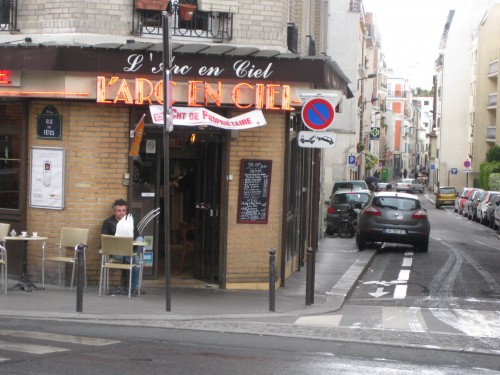Searching for the Dutch-Paris Escape Line
I’ve come to Paris to try to figure out how it came about that over one hundred members of Dutch-Paris were arrested in February and March of 1944, many of them later dying in the concentration camps. John Henry Weidner was more than a little interested in the question himself, and, as a Captain in the Dutch Security Services, in a position to investigate it just after the war.
The original arrest in a long “roll-up” of arrests, happened on 11 February 1944 in Paris when French police arrested a young courier who we’ll call Erna (b. 1921). After her return from Ravensbruck in 1945, she confessed to having told the Germans everything they wanted to know after they tortured her and threatened her father.
I spent a day at the archives of the police looking at the purge dossiers of three officers involved in Erna’s arrest. I can’t say that I learnt very much from them except that they arrested her, which I already knew. She says they arrested her because she had a large bag of food, too much given the current rations. They say they arrested her because she had a false ID, but Dutch-Paris IDs were usually quite good. It’s possible that they arrested her because they suspected her of being Jewish, but that wouldn’t have been something they would have volunteered in a purge hearing.
One thing they all agree on is that the French police arrested Erna in the café l’Arc en Ciel (Rainbow) on the Places des Fetes in a northeastern arrondissement of Paris. After that the only clear detail is that Germans in civilian clothes removed her from the police station.
There followed various forms of “persuasion”; arrests in Paris, Lyon, Annecy and Brussels; deportations, and far too many deaths in the concentration camps.
But how did the Germans know that this young woman had been arrested, apparently by chance? How much did the Germans know about Dutch-Paris and when did they know it? Despite his friendly relations with the Dutch, Belgian, French, British and American police services, John Weidner never succeeded in seeing any German documents regarding the destruction of his network.
Of course, the Gestapo notoriously consigned their files to a bonfire before retreating from Paris and many a filing cabinet in Germany itself was bombed to smithereens. So it’s proving a little difficult to find the German side of the “roll-up”.
In the meantime, I took the métro to the Place des Fetes to find the café where Erna was arrested. I emerged into a the remains of a street market so all I could see were the obviously postwar apartment towers ringing the place. I made my way around the market without much hope until I rounded a corner to see in red neon letters shining against the gray day: “L’Arc en Ciel”
It’s still there: a small triangular café where two streets converge, across from the public baths and an art deco entrance to the metro.
Erna said she was there “to meet somebody.” The French police said they were there in a routine check of a café known to harbor “foreigners.” I was there in hope of a clue.



Leave a reply